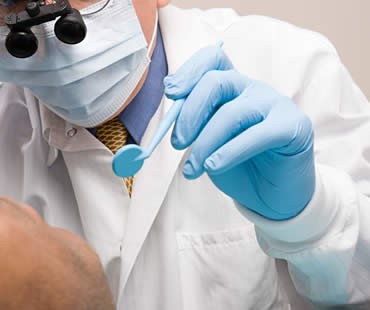
Any type of phobia can be a difficult and often frightening condition, but fear of the dentist can be one of the worst because it can ultimately even be deadly. Proper dental care is vital to a healthy mouth and body. People who neglect going to the dentist for treatment are putting their health at risk, but sedation dentistry offers them a way to get the care they need to maintain better health.
Dental sedation involves administering certain types of drugs, from mild to stronger medications, to help a patient relax. The effects of the drugs decrease anxiety and awareness of the specifics related to treatment, so that procedures can be performed without upsetting the patient. Pain is also diminished so that the patient is comfortable during the dental visit.
Sedation methods vary according to the patient and the treatment. The medication may be given as pills that are swallowed orally, nitrous oxide gas that is inhaled through a mask, or medication given intravenously directly into the vein. Often, local anesthetics might still be required but the patient is already under the effects of sedation and does not feel the injection.
There are a number of benefits provided be sedation dentistry. Patients who otherwise might avoid checkups are able to get preventative care and procedures done without anxiety. They usually don’t remember what happened during treatment, so they come away without negative memories. Patients are also able to sit still during treatment, and for longer periods of time so that multiple procedures may be performed if needed. Lengthy or complex procedures are made possible by using sedation that allows patients to cooperate and not realize how long they are in the dental chair.
Sedation dentistry is a way for patients to obtain necessary dental care without the anxiety or fear that sometimes accompanies it. This can make all the difference in improving some people’s oral and general health.
We treat patients from Longview and the surrounding area

Your good health depends on taking excellent care of your teeth. Not only does proper dental care protect your oral health, but it also has a major impact on your overall health. Routine brushing and flossing are just the start. Establishing a relationship with a good general dentist is a vital part of taking care of both your dental health and your general health.
The focus of general dentistry is to stop minor dental problems before they become large health issues. While many dentists now offer cosmetic and restorative treatments, the main responsibility of a general dentist is preventative. Treating cavities, performing root canal treatment, and performing regular cleanings and examinations are some of the important things services by a general dentist.
Even if you take vigilant care of your teeth, only a qualified dentist or hygienist can remove the plaque and tartar that forms around and below your gum line. Regular checkups allow your general dentist to detect problems that could potentially lead to more serious issues. Caught in the early stages, potential trouble like gingivitis or periodontitis can be successfully treated before they become bigger concerns. General dentistry procedures like scaling, root planning, and root canal treatment can be used to save infected teeth.
Prevention is the key to a healthy smile. Taking proper care of your teeth at home and keeping a regular schedule of cleaning and exam appointments with your general dentist will go a long way towards saving your smile for years to come.
We look forward to seeing you in our Longview dental office

Finding the right dentist is an important decision because it’s a healthcare relationship that can last a lifetime. The need for dental care starts around age one and continues through senior adulthood. For routine dental care, you might choose to see a family dentist or a general dentist. Although there are some similarities, the two types of dentists have some unique aspects.
Services:
Both types of dentists offer routine services that are common to oral health care. This includes examinations, cleanings, x-rays, and fluoride treatments. Instructing patients about dental hygiene such as proper brushing and flossing is part of most family and general dentistry practices as well. Poor oral care can cause decay, infections, gum disease, or other problems. Both types of dentists also offer treatment for when problems arise, such as dental fillings.
Patients:
General dentists often cater to patients in a certain age range, but family dentists provide treatment for patients of all ages. Infants, children, adolescents, adults, and seniors are all able to seek oral health care from a family dentist. Each age group has unique needs and issues, but family dentists are skilled in caring for everyone.
Specializations:
Since they see all ages of patients, family dentists are skilled in a wide variety of procedures. They are able to diagnose and treat many oral health conditions, including gum disease and oral cancer. Typical procedures they offer include tooth extractions, root canals, fillings, crowns, bridges, and sealants. Some are able to perform specialty services like implants and veneers. Many patients enjoy being able to obtain treatment from their family dentist without having to see a specialist.
Benefits:
In addition to the benefit of getting a variety of treatments in one location, family dentists are also able to provide ongoing treatment for all household members. Children and parents go to the same location and can even request back-to-back appointments. Everyone learns the same dental care techniques that they can practice at home together. Family dentists encourage every member of the family to take pride in their oral health.
If you live in the Longview area contact us today

There is no quicker or easier way to dramatically improve the look of your smile than professional teeth whitening. Your dentist probably offers several whitening options and can advise you about the most appropriate type of whitening treatment to ensure your brightest, whitest smile. No matter which whitening treatment you and your dentist decide will be best, there are several tips you can follow to help you achieve the ideal result:
- Have any existing dental problems treated prior to whitening to avoid side effects or complications.
- Schedule a professional teeth cleaning prior to your whitening appointment to remove buildup of plaque or tartar you cannot remove with home cleaning, and provide the best surface for the whitening treatment.
- Begin brushing with a desensitizing toothpaste several weeks before whitening to limit the sensitivity that can sometimes result from whitening agents.
- If you are extremely prone to dental sensitivity, check with your dentist about taking a painkilling medication before your whitening appointment.
- Consult with your dental office to determine how much time you should allow for your whitening appointment.
- Refrain from eating or drinking anything except water for at least one hour after the completion of your whitening treatment, and avoid ingesting foods and beverages that contain stain-causing agents for no less than 24 hours.
- Make sure to attend any follow-up appointments with your dentist.
- Maintain excellent home oral care habits to extend the life of your whitening procedure.
By following these tips, you can boost the results of your professional teeth whitening treatment and face the world with beautiful, bright smile!
We look forward to seeing you in our Longview dental office

One of the greatest gifts you can give yourself is taking care of your oral health throughout your life. Practicing a consistent dental hygiene routine and maintaining regular visits to your general dentist are the best ways to increase your chances of a beautiful, healthy smile.
General dentists focus on preventive care and treating minor problems before they have a chance to worsen into serious issues. Even if you regularly brush and floss your teeth, plaque and tartar can be quick to develop. A dentist has the necessary tools and training to remove damaging deposits before they harm your smile. In addition to professional cleanings and examinations, most general dentists fill cavities, perform root canals, whiten teeth, and even offer additional cosmetic dental procedures like dental implants or veneers.
One of the main reasons for routine examinations is to identify various problems. One common issue that you want your general dentist to catch early is gum disease. When it is treated soon after it starts, you are more likely to avoid bone deterioration or tooth loss. The early stage of gum disease is called gingivitis and can be handled by your dentist with simple techniques. If it advances to periodontitis, that’s when bone or tooth loss become a possibility and more invasive procedures like scaling or root planing may be required.
Once you make your dental appointment, which is typically recommended every six months, make sure you keep your scheduled visit. Many patients fall victim to scheduling appointments and then cancelling, not realizing how important seeing your general dentist can be. If you have dental insurance, you can even use your dental benefits for examinations and treatments. This office accepts Blue Cross/Blue Shield of Louisiana, MetLife, and Cigna.
Choose a qualified general dentist and establish a long-term relationship now, so that you can enjoy your healthy and appealing smile for years to come.
We treat patients from Longview and the surrounding area

Your dentist plays an important role in your family’s healthcare. It’s more than just a teeth cleaning to keep your smile looking good; it’s a partner who helps ensure both your oral and your general health are the best they can be. That’s why it’s imperative to choose a qualified and skilled dental professional that you can stick with through the years to manage the oral health of each member of your family.
Ask friends, coworkers and neighbors for recommendations for a family dentist or conduct an online search. Once you have narrowed down your choices, schedule a consultation so that you can gather more information and get a feeling about the practice.
Consider the dentist’s credentials and experience. The dentist should have graduated from an accredited dental school and passed all exams and other requirements. Find out if the dentist has any specializations that you or a family member might be interested in, such as orthodontics or root canal therapy. If the practice offers more than one dentist in a group, make sure anyone you’ll see has the same level of experience and training. Ask about continuing education to see if the dentist keeps up with the most current techniques and trends.
Every family dentist should be willing to work with patients of all ages, but if you have family members who are very young or very old, make sure the dentist is skilled in their specific care. Inquire about options available for dental fears such as sedation dentistry.
Pay attention to all aspect of the dental office when you are there. Is the latest equipment available? Is the staff friendly and accommodating? Are you able to ask questions and get all of the information you need? Is the office location convenient? Are multiple appointments offered during one time slot? Do they offer emergency hours? Are financial policies outlined clearly?
A good family dentist takes the time to treat you and your family with care and personalized attention, as well as skill and confidence. Look for a professional who will play a trusted role as part of your healthcare team.
If you live in the Longview area contact us today









